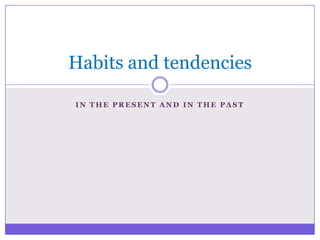
Habits and tendencies
- 1. Habits and tendencies IN THE PRESENT AND IN THE PAST
- 2. Habits in the Present Habits in the present are normally expressed by the Simple present + adverb of frequency or an adverb phrase. I rarely go to a football match nowadays but I watch football on TV as often as I can. We buy a TV guide every Friday.
- 3. Will However, among other uses of the Future Simple, will + infinitive can be used when we wish to emphasize actions that are characteristic/predictable of a person, habits and tendencies. Will = tend to When you ask Dad for money, he‟ll always say “no” at first. He‟s strange – he‟ll sit for hours without saying anything.
- 4. Present Continuous Present continuous + always, constantly, etc.: habits that annoy us, surprise us or happen more often than usual. He‟s always leaving dirty clothes all over the place. I like her because she‟s always making jokes. (no annoyance)
- 5. Remember - page 21 Apart from some of the young people, most people won‟t speak English. You will have at least three, four coffees a day.
- 6. Habits in the Past The most usual way of talking about habits in the past is to use the simple past tense with an adverb of frequency or an adverb phrase. When I was younger, I went running every day. As a student, she got up late every morning. (habit) I lived in Austria for several years. (state)
- 7. Used to Used to is used to describe past habits and states, usually in contrast with the present. We use ‘used to’ for something that happened regularly in the past but no longer happens. A time expression is not necessary. I used to get up at six, but now I get up at eight. Used to can also describe past states. I used to own a horse. (I owned a horse once.)
- 8. Used to Used to can be used in the affirmative, the negative and questions. Note these forms: I didn’t use to like beer. Did you use to swim every day? I used to read more in English than I do now. I didn‟t use to waste so much time watching TV. Which subjects did you use to like best at school?
- 9. Would You can use would („d) to talk about regular or repeated actions in the past but not for states. It is often used for personal reminiscences, and sometimes suggests a feeling of nostalgia. An expression of time is needed. 'When I was young, I used to visit my grandmother every summmer.'→ ' When I was young, I would visit my grandmother every summer.' Note: Both of these sentences have the same meaning.
- 10. Would If the sentence is not about a repeated habit/action, or does not include a time expression, we can not use 'would': 'I used to play piano.'→'I would play piano.„ It is more natural to say: 'I used to play piano. I would practise every day.'
- 11. Would and used to We don‟t use either used to or would when we say exactly how many times something happened, how long something took, or that something happened at a particular time. We visited Switzerland four times during the 1990s. She went on holiday to the Bahamas last week.
- 12. In longer texts In longer texts about past habits and routines, you normally start with used to, then continue with would. When I was younger, we used to go swimming every weekend. Every Saturday we‟d get up at about 8 o‟clock, then our mum would help us pack our swimming suits and our dad would prepare sandwiches for us.
- 13. Adverbials To emphasize the idea of habit or tendency, we often use adverbials of frequency with these structures. She‟ll often stop and talk to me. She would cook a meal once in a blue moon. He was always suggesting interesting ideas.
- 14. Annoying habits You can use will/would to express your annoyance about the way someone typically behaves. In this case, will is usually stressed and not contracted. I was happy when Sam left. He would talk about people behind their backs. You can also use always + present or past continuous. She is always telling the same old stories.